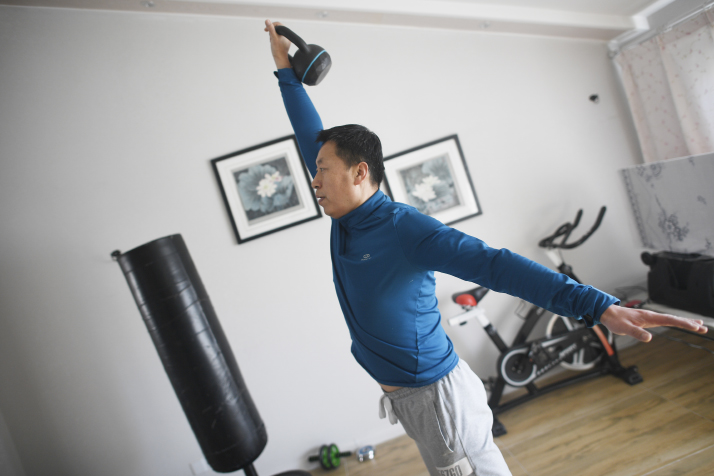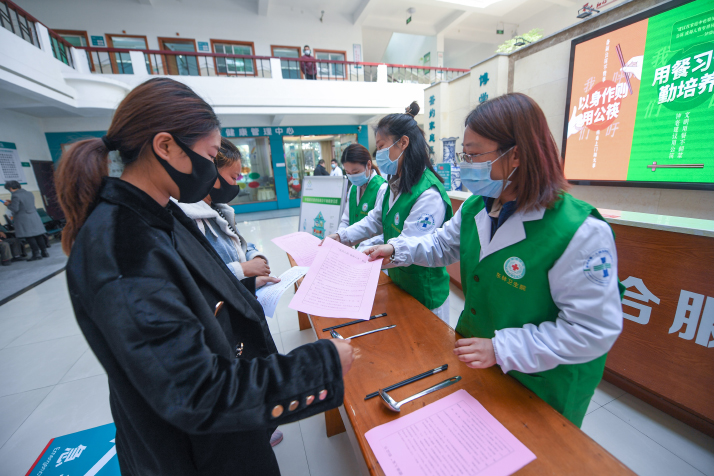|
||||||
|
||||||
| Home Nation World Business Opinion Lifestyle China Focus ChinAfrica Video Multimedia Columnists Documents Special Reports |
|
||||||
|
||||||
| Home Nation World Business Opinion Lifestyle China Focus ChinAfrica Video Multimedia Columnists Documents Special Reports |
| Nation |
| Turning Over a New Leaf |
| Novel coronavirus outbreak changes people's everyday habits and rituals |
| By Ji Jing · 2020-03-20 · Source: NO.13 MARCH 26, 2020 |
 Zhang Ning, a fitness coach in Yinchuan, Ningxia Hui Autonomous Region in northwest China, films a video showing how to exercise at home on March 8 (XINHUA)
As a senior manager at a training institution in north China, Chang Qing used to have a hectic schedule, which left her no time for cooking. But since the novel coronavirus outbreak, which has forced people to stay indoor till it is brought under complete control, she has transformed into a chef. She cooks regularly at home now and often posts photos of the dishes on social networking platforms. "I follow a healthier diet now," Chang, who used to eat out or order food online in the past, told Shijiazhuang-based Hebei Daily. "I am going to maintain a healthy diet even after the epidemic is over and I go back to my normal work schedule." Like Chang, many people are cooking more often at home as many restaurants still remain closed and many are worried about the safety of delivered food. New home entertainment According to data released by food delivery company Meituan-Dianping on February 19, the number of searches for baking tools and materials jumped more than 100 times during the Spring Festival holiday period, which lasted from January 24 to February 2 this year. The sale of yeast, another baking ingredient, increased nearly forty-fold and dumpling wraps over seven times. Many respondents reported making dumplings and bread at home, while making cakes in a rice cooker also became a fad. The enforced stay at home has also become quality time spent with parents and other family members, especially for those who work outside their hometown. Liu Yizhou, who works in Beijing, went home in Hengshui in north China for the Spring Festival and has been held up there by the outbreak. While the entire family stays mostly at home, cooking has become a stronger bonding factor for them. Every day Liu goes out to buy vegetables, his wife helps him wash them, and his mother cooks. Over their meals, the whole family shares news they find interesting. Liu said he had never spent so much time with his family for years. Moreover, in recent months, people have also begun to read more. The photograph of a patient reading The Origins of Political Order: From Prehuman Times to the French Revolution, a book by American political scientist Francis Fukuyama, in a temporary hospital in Wuhan, the city ravaged by the epidemic, went viral last month. The 39-year-old reader's composure in the face of the epidemic made netizens admire him. A teacher at Florida State University in the U.S., identified only by his surname Fu, he came to Wuhan to visit his parents, where he got infected. He was cured after over 20 days' treatment in hospital. "People have been feeling anxious during the epidemic and the anxiety becomes even more acute when they browse news about the epidemic. It was not until I saw the photo that I realized reading can help me calm down," Zheng Yushan, who works with a cultural institution in Hebei Province, told Hebei Daily. Zheng said before the epidemic, being busy with his work, he read mostly in a fragmented way, so it usually took him over 10 days or even a month to finish a book. Now with more time and being more focused, he can finish reading one or even two books in a day. Books on epidemics and medicine were among the most searched ones, according to data service provider Shenzhen Hexun Huagu Information Technology Co. Ltd. Its big data shows that 3.76 million active users of WeRead, an online community for book lovers, spent 70 minutes on average reading on the platform every day at the end of February. In addition to reading, many people have taken to exercising at home, starting with easy ones such as basic yoga poses. Videos teaching how to exercise at home are becoming more popular and exercise aids such as yoga mats and dumbbells are selling briskly on e-commerce platforms.  Hospital workers in Donglin, a town in Zhejiang Province, east China, give leaflets to visitors urging them to use severing chopsticks and spoons while eating in a group on March 17 (XINHUA)
New hygienic habits The epidemic has also changed people's table etiquette. Chinese often eat communally and share their dishes. However, the health authorities in Beijing, Shanghai and Guangzhou cities have been asking diners to eat from their own plates and use separate pairs of chopsticks and spoons to take food from the serving bowl when people eat together in order to reduce the chance of infection. Beijing-based World Federation of Chinese Catering Industry has issued a guideline to Chinese restaurants and consumers at home and abroad, advocating developing healthy dietary habits and table manners such as eating separately. In response to that, a woman in Shanghai, identified only by her surname An, told Xinhua News Agency that she had always wanted to promote eating separately in her family but elderly members opposed the idea. Due to the epidemic they have now agreed to do it, she said. A survey by Guangzhou-based Southern Metropolis Daily revealed that 85 percent of the 1,900 plus respondents said one should eat from one's own plate when eating in a group. However, 61.8 percent said they were still not doing so. Some said they tried to do it at home but other family members objected. But after the epidemic breakout, washing hands with soap upon returning home has become a more common habit. According to a survey in Shenzhen in south China, 98 percent of the respondents said they developed the habit during the epidemic. According to UK-headquartered consulting firm Kantar, sales of hand sanitizers and disinfectants on e-commerce platform Tmall surged over 30 times during the Spring Festival holiday. The epidemic has also pushed up the disinfectant output, which is expected to surpass 11.5 billion yuan ($1.63 million) in 2020. A Beijing resident, identified only by her surname Pan, said she bought five bottles of disinfectant after the epidemic broke out, and the entire family has now developed the habit of washing hands frequently and disinfecting whatever can be disinfected. Zhang Mingliang, a doctor with the Shijiazhuang No.1 Hospital in Hebei, said some of the habits formed during the epidemic should be maintained. For instance, "people should wear masks when they have a cold to prevent infecting others. They should also wear masks when they go to the hospital to protect themselves," Zhang told Hebei Daily. "Covering the mouth and nose when coughing or sneezing, not spitting and maintaining a distance from other people when queuing in public areas—all these habits should be maintained even after the epidemic," he said. Copyedited by Sudeshna Sarkar Comments to jijing@bjreview.com |
About Us | Contact Us | Advertise with Us | Subscribe
|
||
| Copyright Beijing Review All rights reserved 京ICP备08005356号 京公网安备110102005860号 |